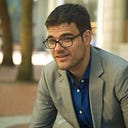I found my spiritual walk eventually required this too. At first, it started alone and I honestly didn’t know anyone I could connect with due to the fact it was a very internal process breaking away from other narratives.
Eventually, I knew I needed a teacher and prayed, and they arrived to help supplement the journey.
Ended up in Portland and found an amazing Jewish synagogue. The living face, the breath, the songs, the dancing, and the drums. I think it’s incredibly important to an integrated experience of the divine.
I’m lucking out here in Bali where it’s a consistent part of society. Every day is a ritual.
Can you imagine a society that allows that level of community and ritual practice but in a way that gives freedom to the diversity of the narratives?
They already sort of have that here in the fact they’re supportive of narratives. I was asked if I go to Church back at home and I had to say I go to synagogue, Shiva Puja, Shamanic circles. . . in the states look at me like I’m crazy, here they get excited because it means you’re connected to God.
Still, the narratives of how life itself is played out are more restricted then what the West has come to find comfortable.
So my constant question is how can we create the environment for diverse narratives while establishing a framework that allows for the interconnected community, communication of our narratives, and meaningful group ritual?
